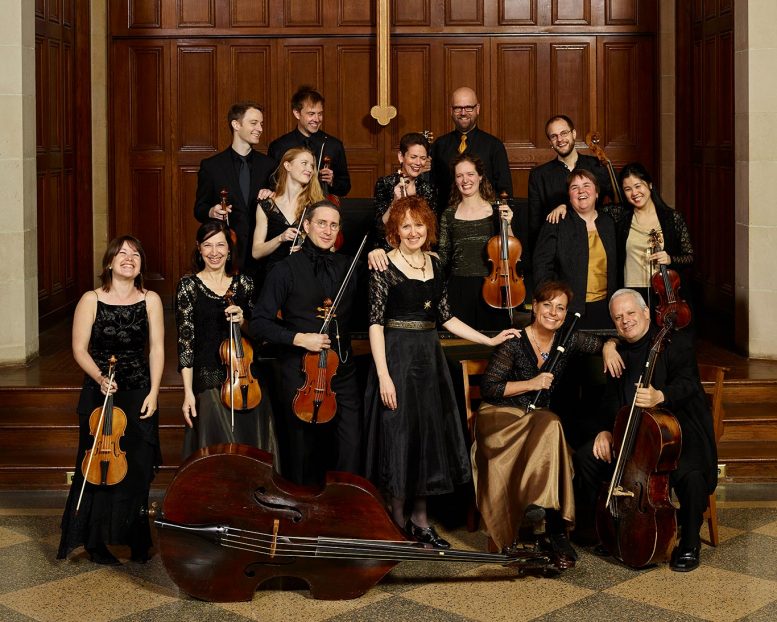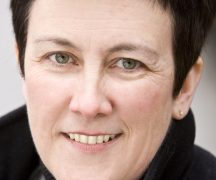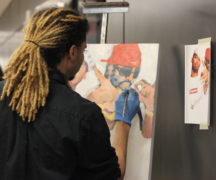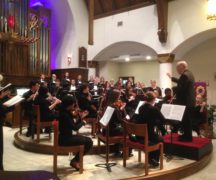By DAVID DUPONT
BG Independent News
Back when Bach’s music was new, the composer and other professional and student musicians would hang out at Cafe Zimmermann, a coffee house in Leipzig, Germany, to play the latest sounds.
Apollo’s Fire, a Baroque music ensemble based in Cleveland, will take listeners back to that time in the mid-18th century when it presents “A Night at Bach’s Coffeehouse” Wednesday, Feb. 6, at 8 p.m. in Kobacker Hall on the Bowling Green State University campus.
The free performance is part of Apollo Fire’s three-day residency presented by the Dorothy E. And Duwayne H. Hansen Musical Arts Series (https://www.bgsu.edu/musical-arts/events/residencies/hansen-musical-arts-series.html). During the residency the ensemble will hold open rehearsals and master classes for flutists and string players.
The BGSU visit will feature an 11-member version of the ensemble, which was founded by Jeannette Sorrell 26 years ago.
Kathie Stewart, the ensemble’s flutist, has been a collaborator and friend of Sorrell since before she started Apollo’s Fire.
The two musicians met at Cincinnati Conservatory, where both were pursuing graduate work. Sorrell was studying harpsichord and conducting, and Stewart was working on a doctorate in flute performance.
In Cincinnati, Stewart discovered her love of Baroque music. In the course of her studies, Stewart had played music from the history of flute from early music through contemporary. Her attention always seemed to return to the Baroque period. While later music tends to be “messy,” she said, “Baroque music is calm and clear. It gets messy enough, but then it all resolves.”
By this time, Stewart said she was working hard on her instrumental studies. “But I wasn’t loving it.”
The conservatory had a Baroque flute.
She took the instrument into a practice room to try to play music by Bach and Telemann. “It was horrifying,” she said. She found a book to guide her, and with that she applied herself to the period instrument.
“I tried things that were awkward and didn’t make sense on modern flute. They made perfect sense on the Baroque flute. I learned from the instrument what Baroque music was all about. Finally I was able to play the music I really loved on the instrument it was written for,” Stewart said. “It revived my appreciation for the flute in general. The flute itself re-energized me to play music for the rest of my life.”
A large part of that has been with Apollo’s Fire. Stewart said that Sorrell (who will not be with the ensemble at BGSU) was at Oberlin and a number of other early music enthusiasts were also in the area.
With Sorrell as leader and harpsichordist, they formed the core of Apollo’s Fire.
“The audience is so supportive,” Stewart said. She said the orchestra’s been “amazed how really positive the audience has been for 26 years.”
Cleveland was selected as the home base because of its proximity to Oberlin. At first, Cleveland was where the ensemble played. Then it branched out to Akron, and soon made short jaunts to other nearby cities. That circle expanded with longer tours throughout the country. About 10 years ago, Apollo’s Fire did the first of five European tours.
The ensemble also expanded the range of music it played to include Celtic music and the traditional mountain sounds of the southern U.S. that were influenced by it.
That music is close to the hearts of Sorrell and Stewart, who both grew up in that region. The ensemble’s most recent recording, “Christmas on Sugarloaf Mountain,” is devoted to that style.
While modern listeners may make a clear distinction between pop sounds and classical sounds, in Bach’s time there was no such division, Stewart said.
Bach and others freely drew on popular dance styles of the time and employed folk tunes in their compositions.
Opening the BGSU program, Apollo’s Fire will perform “La Bergamasca” by Marco Uccellini, which is based on a folk tune.
Keeping with the practice at Cafe Zimmermann, the rest of the program will be a mix of Bach and those of his contemporaries he most admired with selections from Telemann’s “Don Quixote Suite” and two concerti by Antonio Vivaldi.
Stewart will be featured on one of those, “The Goldfinch.”
The program will conclude with selections from Bach’s Orchestral Suite No. 2 in B minor.
The ensemble will perform in a manner true to the spirit of the coffee house, Stewart said.
The performance includes “a lot of improvisation and ornamentation on the spot,” she said. “We try to communicate the rhythm with our bodies and with our instruments. There’s a lot happening in the moment. You have to be on your toes all the time and watching, so that’s what we do. … That’s the nature of the group to be very communicative in playing, which is probably what they did in Zimmermann’s.”





